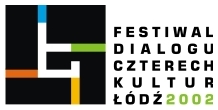FESTIVAL OF THE DIALOGUE OF FOUR CULTURES
Idea
The Festival of the Dialogue of Four Cultures was established in 2002 on the initiative of Witold Knychalski, president of the Society for Dialogue of Cultures “Łódź – Land of the Future.” From the start, it has been characterized by cultural diversity and creative partnership of nations, owing primarily to the individuality of Łódź, “a damned city” for some, and “a promised land” to others. There is no other city in Poland with such a history and tradition. For nearly two centuries Poles, Jews, Germans and Russians lived here side by side, creating a phenomenon on the scale of today’s united Europe. The Festival seeks to restore the long-interrupted dialogue which, despite the change in political, historical and cultural realities, can be continued – in the universal language of art.
“We have tried to draw on tradition to demonstrate how important it is today for building new ties. Each of the nations once living in Łódź considered itself the host of the city. As people of different ethnicities settled here, they built everything from scratch, with their own hands and their own money. First came the material culture, its development driven by textile industry. Then, when there was a house and a workshop, then another one, followed by a factory, the spiritual culture began to grow. First you needed a temple, then newspapers, books, theatre. A conglomerate of diverse forms. You had to learn to be very moderate, tolerant of other traditions and languages. It was that balance that brought us growth. And that’s how we are going to live in Europe.” said Witold Knychalski in one of the interviews (Małgorzata Karbowiak, "Wchodzimy do Unii Europejskiej dziś?", "Kalejdoskop" May 2004).
The Four Cultures Festival draws on another Łódź tradition. Its guidelines resemble those of the Theatre Festival “Promised Land,” which was created by Zdzisław Hejduk, founder and long-time director of Theatre 77, in 1988. The organizers’ intention is for artistic events to engage the entire space of the city, which is why they are held not only in the many cultural institutions, but also in the historical interiors, forgotten factory buildings and on the streets of Łódź.
In the course of six years and as many editions, the Festival of the Dialogue of Four Cultures has developed into a promotional asset for the city and a prestigious event of international standing. It is popular both in Poland and abroad, and has attracted a faithful and numerous audience in Łódź since its inception. The Festival enables Łódź to regain its old, multicultural atmosphere and original identity. Witold Knychalski, originator of the Festival, received a medal “For Services to Tolerance” in 2004.
1st Edition
The first Festival of the Dialogue of Four Cultures was held from 27 September to 6 October 2002. From the start, the Festival has had an interdisciplinary character. The programme included offerings from a variety of disciplines: theatre performances, film screenings, fine art projects, and music from jazz through folk to opera and symphony concerts.
As part of the first edition of the Festival, the Wielki Theatre-National Opera presented a production of Karol Szymanowski’s King Roger directed by Mariusz Treliński. The Łódź audience heard a performance by the Kronos Quartet, a string quartet founded by David Harrington in 1973, whose recordings have won numerous prizes, including Grammy, Edison and Deutscher Schallplatten awards. There was also a special concert of the music of Henryk Mikołaj Górecki, one of the world’s greatest composers, who received the Tansman Award at the Festival for the unique individuality and uncompromising nature of his work. Górecki’s pieces were performed by the National Symphony Orchestra of the Polish Radio in Katowice and the choir of the National Philharmonic conducted by Wojciech Michniewski.
“The Master and His Trophies. The Awards of Andrzej Wajda 1958-2000” showcased the director’s gift to the Museum of Cinematography – a collection of 143 awards he received throughout his career. The programme of exhibitions included works by the Polish painter Ewa Rosenstein, a member of the Krakow Group who also pursued drawing, collage and poetry, as well as the photographs of Marlene Dietrich, part of the legendary artist’s rich legacy from the collection of the Deutsche Kinemathek Berlin.
There was a vast survey of films produced by TVP and ARTE, featuring about fifty documentaries and recordings of the Television Theatre, and a retrospective of “Prewar Jewish Cinema in Poland (films by Aleksander Ford, Józef Green, Michał Waszyński and Aleksander Marten).” Cinema buffs were also treated to premiere screenings of two films: Dziewice directed by Jerzy Śladkowski and Moje pieczone kurczaki directed by Iwona Siekierzyńska.
Artistic events took place in several Łódź theatres, at the Łódź Philharmonic, in galleries, cinemas and the city space, mainly on Piotrkowska Street. Maciej Domański, head of the Polish Television Office for International Cooperation, was the artistic director of the first Festival.

[get Acrobat Reader:
www.adobe.com]

